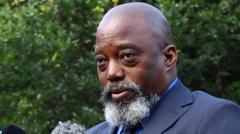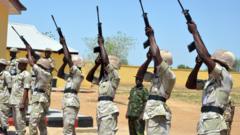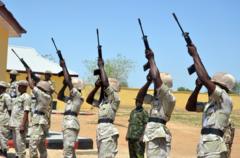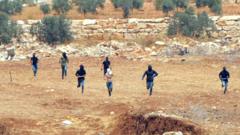Joseph Kabila, the former president of the Democratic Republic of Congo (DRC), has made waves by returning to the nation for the first time in two years. Arriving in the eastern city of Goma, Kabila's presence revives discussions about his controversial legacy and ongoing conflicts within the region.
Kabila's Return: A Controversial Comeback to DR Congo

Kabila's Return: A Controversial Comeback to DR Congo
Former President Joseph Kabila makes his first return to DR Congo after two years amidst political turmoil and allegations of war crimes.
Ex-DR Congo president Joseph Kabila is back in the country for the first time in two years, having landed in the rebel-held eastern city of Goma, according to statements from both rebel spokespeople and a youth leader from his party. Kabila’s return follows the stripping of his parliamentary immunity by senators over alleged connections to the Rwanda-backed M23 rebel group currently in conflict with the Congolese army.
The former president, who governed the DRC for 18 years before transitioning power to President Félix Tshisekedi in 2019, has consistently denied accusations of collusion with the M23. In a recent statement, he claimed the judicial system has been misused for political purposes. Innocent Mirimo, a Goma youth leader for Kabila's People's Party for Reconstruction and Democracy (PPRD), characterized Kabila’s return as a joyful homecoming, saying, "For us it is like a father has returned to his children."
Complications have arisen as authorities in Kinshasa banned the PPRD, criticizing its supposedly ambiguous stance towards the M23’s territorial advances. In a message shared via social media, M23 spokesperson Lawrence Kanyuka extended a warm welcome to Kabila, expressing hopes for his pleasant stay in the “liberated areas.”
The government's allegations against Kabila involve serious accusations of war crimes and treason, backed by claim of substantial evidence linking him to rebel activities. Kabila took to YouTube to brand the current government a "dictatorship," lamenting a perceived decline in democracy.
The ongoing conflict, which reignited in 2021 after a peace deal faltered, has seen the M23 make significant territorial gains this year, notably capturing Goma in January. This resurgence of violence has led to the displacement of numerous civilians. Kabila has spent the past two years in South Africa but stated earlier this month his intention to return to assist in mitigating the conflict.
The complexities of Kabila's political past and the current geopolitical atmosphere present a challenging landscape for the future of the DRC.
The former president, who governed the DRC for 18 years before transitioning power to President Félix Tshisekedi in 2019, has consistently denied accusations of collusion with the M23. In a recent statement, he claimed the judicial system has been misused for political purposes. Innocent Mirimo, a Goma youth leader for Kabila's People's Party for Reconstruction and Democracy (PPRD), characterized Kabila’s return as a joyful homecoming, saying, "For us it is like a father has returned to his children."
Complications have arisen as authorities in Kinshasa banned the PPRD, criticizing its supposedly ambiguous stance towards the M23’s territorial advances. In a message shared via social media, M23 spokesperson Lawrence Kanyuka extended a warm welcome to Kabila, expressing hopes for his pleasant stay in the “liberated areas.”
The government's allegations against Kabila involve serious accusations of war crimes and treason, backed by claim of substantial evidence linking him to rebel activities. Kabila took to YouTube to brand the current government a "dictatorship," lamenting a perceived decline in democracy.
The ongoing conflict, which reignited in 2021 after a peace deal faltered, has seen the M23 make significant territorial gains this year, notably capturing Goma in January. This resurgence of violence has led to the displacement of numerous civilians. Kabila has spent the past two years in South Africa but stated earlier this month his intention to return to assist in mitigating the conflict.
The complexities of Kabila's political past and the current geopolitical atmosphere present a challenging landscape for the future of the DRC.




















